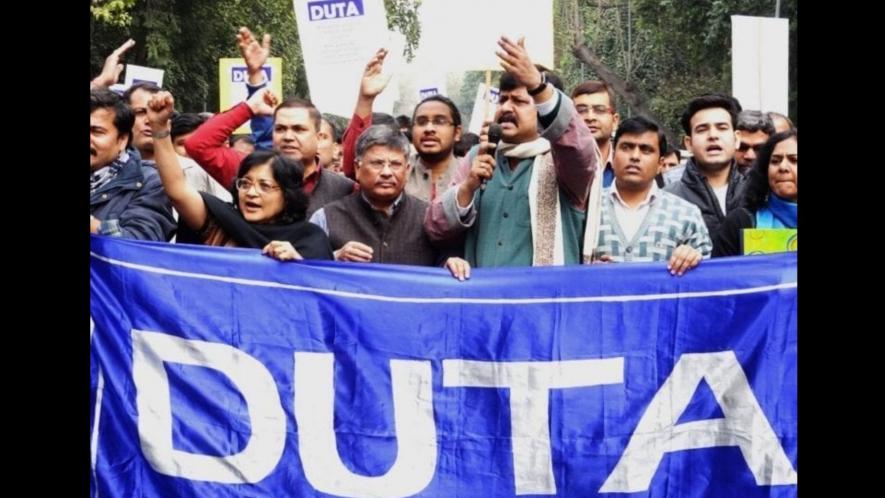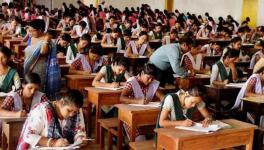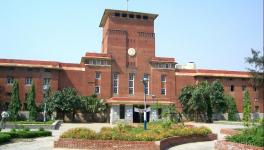DU: Displacement of Teachers, Increased Workload to Dominate EC, AC elections

Image Source: NewsClick
As the Delhi University teachers' unions blew the poll bugle with the announcement of candidates, the issues of displacements and workload are expected to dominate the month-long campaign. The elections for Executive and Academic Councils will be held on February 9, 2023.
The Democratic Teachers Front, a left-leaning group, has nominated Deo Kumar as a candidate for the Executive Council and Biswajit Mohanty, Monami Sinha, Mithuraaj Dhusiya and Vikas Gupta for the Academic Council.
Similarly, the Aam Aadmi Party-backed Action for Academics and Development has fielded Seema Das for the Executive Council and Alok Ranjan Pandey, Sunil Kumar, Ram Kishore Yadav and CM Negi for the Academic Council.
The Rashtriya Swayamsevak Sangh-backed National Democratic Teachers Front, which presently leads the Delhi University Teachers Association (DUTA), has relied on Sunil Kumar for the Executive Council and Sudershan Kumar, Dhanpal Singh, Vikas Sharma, Harendra Nath Tiwari, Ashok Kumar Yadav, Vivek Chaudhary Dhankar and Seema Singh for the Academic Council.
The opposition groups maintain that the NDTF-led DUTA failed to protect the livelihoods of displaced teachers who were removed from their posts in the latest recruitment drive of the university. Deo Kumar, EC candidate from the DTF told NewsClick that the elections were crucial to saving the public-funded university, which is currently witnessing large-scale displacements.
Kumar said, "The teachers at Delhi University taught for years and maintained the academic discipline missing in other universities. They ensured that students graduated in three years, did their master's in two years and completed their M.Phil in 1.5 years. Still, quality teachers have been removed from their posts." He said that many good teachers were kept in ad-hoc positions for years, and after serving for 20 years, some of these teachers were asked to leave. "Where will they go at this age? Had you informed them that there would be no permanent job at the university, they would have chosen a different path," he said.
Kumar said the worst part is that the colleges have closed recruitment on an ad-hoc basis. When a teacher teaching in a college gets a permanent job in another college, a vacancy is created in the former one. But the former college then looks for guest faculty to fill that position, he said, explaining that whereas an Ad-hoc teacher still gets the starting salary of an assistant professor, a guest would only get money as per the number of classes attended. "So, it is complete chaos that is bound to hurt the university in the long run," he commented.
"Similarly, we are witnessing new rules on workload by the university administration, which was interestingly suggested by a member of NDTF as the size of tutorial classes has been increased. Again, it will cause displacement and compromise the quality of education. In 2019, the teachers of the university led a historic movement to stop the conversion of ad-hoc posts into guest posts. Three years later, we are in the same position," Kumar said.
Answering whether the absorption was just for new entrants in teaching, Kumar maintained that the recruitment drive killed the best of the talent to the extent that staff associations of the colleges had to express their discontent. He said, "It is correct that merit should be given priority, but who gets to define it? Just look at the bio-datas of the displaced teachers in Ramjas College, Hansraj College and Laxmibai College. A teacher who has been teaching for 20 years should have some merit that he could teach for this long period. Ask the displaced teachers how they were ousted from the interview rooms in two minutes. I mean, the teachers who passed MSc from IIT Chennai were ousted. Were they not meritorious?"
Abha Dev Habib, Secretary of the Democratic Teachers Front, argued that much of the developments in the university should be seen in the context of the New Education Policy, which has not been opposed by the current DUTA leadership. She said, "The academic restructuring as per NEP 2020 threatens the future working conditions of teachers and students' learning conditions. This is because the restructuring involves multiple entry-exit FYUP, Academic Bank of Credits, promoting online learning as a substitute for physical mode, and choices offered to students in a manner that institutionalises demand-based contractual appointment of teachers."
She added, "It will be foolhardy to ignore the impending administrative and regulatory restructuring following the NEP 2020. Only those obligated to smoothen the passage of NEP would have teachers believe national policies should not concern them. Reports in the media suggest that the HECI bill to replace the existing Acts relating to the UGC and the universities is to be placed in the winter session of the Parliament. The existing regulatory structures of higher education are to be replaced by a new 'light but tight' structure that, among other things, hands over each college or university to a BOG which will have full or unbridled powers over courses and teachers."
A similar charge also came from Rajesh Jha from the AAP-backed Action for Academics and Development Teachers Association, who alleged that the instability has been deliberately infused to push privatisation and contractualisation through the NEP.
Jha said, "When the situation becomes vulnerable, it is easy to get people frightened and get your job done. Currently, teachers are frightened if they will retain their jobs or not. The entire education model is being shifted from a loan-based model to a grant-based one." He added, "We have already seen the JNU vice-chancellor increasing fees because they took loans from the Higher Education Financing Agency. Then, a UGC-mandated document reduces credits for undergraduate degrees. These will not only reduce the workload but also cause great social casualty because 50% of our students come from SC, ST and OBC backgrounds. Just imagine the education sector without these students because they cannot afford costly private education. In this context, these elections are quite important."
DUTA President A K Bhagi did not respond to NewsClick's calls, which were made to get his view on these prevailing issues.
Get the latest reports & analysis with people's perspective on Protests, movements & deep analytical videos, discussions of the current affairs in your Telegram app. Subscribe to NewsClick's Telegram channel & get Real-Time updates on stories, as they get published on our website.























